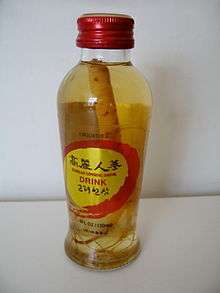Insam-cha
 | |
| Type | Traditional Korean tea |
|---|---|
| Country of origin | Korea |
| Ingredients | Ginseng, honey |
| Korean name | |
| Hangul | 인삼차 |
|---|---|
| Hanja | 人蔘茶 |
| Revised Romanization | insam-cha |
| McCune–Reischauer | insam-ch'a |
| IPA | [in.sam.tɕʰa] |
| Ginseng root hair tea | |
| Hangul | 미삼차 |
| Hanja | 尾蔘茶 |
| Revised Romanization | misam-cha |
| McCune–Reischauer | misam-ch'a |
| IPA | [mi.sam.tɕʰa] |
Insam-cha (인삼차; 人蔘茶; lit. "ginseng tea") is a traditional Korean tea made with ginseng, pine nuts, and honey. It has a strong fragrance and taste. Ginseng is prized in Korea, and is thought to improve vitality and physical strength. Some studies have suggested that the saponin in ginseng may have anti-cancer properties.[1]
A tea made from ginseng, which can be a fresh ginseng (수삼; 水蔘; susam), a dried ginseng (건삼; 乾茶; geonsam). The sliced or whole ginseng is boiled for a few hours, and then refined sugar (or unrefined sugar such as honey) may be added. A common ratio is 500 mℓ of water to 50 g of ginseng. Sometimes, jujube can be added when boiled. Some believe that insamcha is good for increasing energy, especially for someone who catches colds frequently in winter. It also has a remedial effect on stomachaches due to low body temperature. However, neither belief has been shown in independent scientific evaluations.